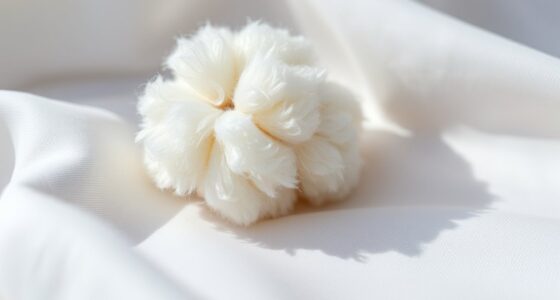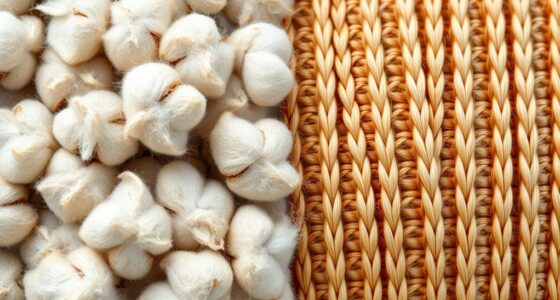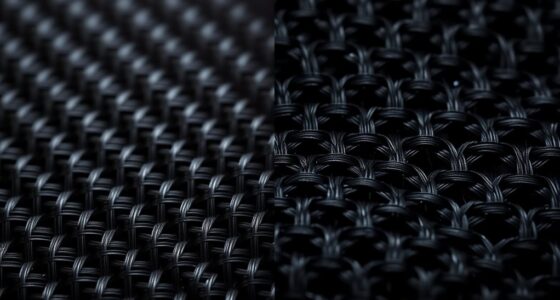A higher thread count often suggests a denser, more luxurious fabric, but it doesn’t automatically mean better quality or comfort. Factors like fiber type, fabric finishes, and how the sheets are made matter more than just the number of threads woven into each inch. Sometimes, manufacturers increase thread counts by tightening twists or blending threads, which can reduce breathability. To truly find the best sheets, you’ll want to contemplate all these elements—learn more below.
Key Takeaways
- Thread count indicates fabric density but isn’t the sole factor in sheet quality or comfort.
- Higher thread counts can result from tighter weaving or multi-ply threads, not necessarily better sheets.
- Fiber type (like Egyptian cotton) and fabric finish often impact softness and durability more than thread count.
- Excessively high thread counts may produce heavier, less breathable sheets, reducing comfort.
- A balanced approach considers fiber quality, finishes, and thread count for better overall sheet selection.

Ever wonder what thread count really means when choosing your sheets? It’s a common question, especially when you’re trying to find the perfect set for a good night’s sleep. Thread count refers to the number of threads woven into one square inch of fabric, but it’s not the only factor that determines quality. To really understand what makes sheets comfortable and durable, you need to look beyond just the numbers. Fiber types and fabric finishes play significant roles in how the sheets feel and hold up over time.
When it comes to fiber types, not all materials are created equal. Cotton is the most popular choice because of its softness and breathability, but the variety of cotton fibers makes a big difference. For instance, Egyptian and Pima cotton are known for their long-staple fibers, which produce smoother, stronger, and more luxurious sheets. Shorter fibers, like standard upland cotton, tend to be less durable and may feel rougher. Linen, bamboo, silk, and microfiber are other options, each offering unique qualities. Linen, for example, is highly breathable and develops a softer feel with each wash, while silk provides a silky smooth texture. Microfiber, made from finely woven polyester, can mimic the feel of natural fibers at a lower price but may not be as breathable.
Fabric finishes also influence how sheets feel and perform. Some sheets undergo treatments like mercerization, which enhances sheen and strength, or enzyme washing that softens the fabric. These finishes can make a significant difference in comfort, regardless of thread count. A high thread count sheet with a harsh or stiff finish can feel less inviting than a lower thread count sheet with a soft, smooth finish. It’s important to factor in how the fabric has been processed because these treatments can improve durability and comfort without necessarily increasing the thread count. Additionally, advancements in fabric engineering continue to enhance softness and durability even at lower thread counts.
While a higher thread count might suggest a denser, more luxurious fabric, it doesn’t automatically guarantee better quality. Sometimes, manufacturers increase thread count by twisting threads more tightly or using multi-ply threads, which can result in a heavier, less breathable sheet. Instead, focus on the fiber quality and fabric finishes, which directly impact how sheets feel against your skin and how long they last. By paying attention to these factors, you’ll make a smarter choice that combines comfort, durability, and value. Ultimately, understanding the interplay between fiber types and fabric finishes helps you pick sheets that truly meet your needs, regardless of the thread count number.
Frequently Asked Questions
How Does Thread Count Affect Breathability and Temperature Regulation?
Higher thread count can impact breathability and temperature regulation by making fabrics denser, which may trap heat and moisture. If the thread count is too high, it could reduce airflow, causing you to feel warmer and less comfortable. To stay cool and dry, look for sheets that balance thread count with breathable, moisture-wicking fibers. Lower to mid-range thread counts often offer better heat regulation without sacrificing softness.
Is a Higher Thread Count Always More Durable?
In the blink of an eye, you’ll find that a higher thread count isn’t always more durable. While it often enhances fabric softness and aesthetic appeal, durability depends on fiber quality and weave, not just thread number. You might love the luxurious feel, but don’t assume higher counts guarantee longer-lasting sheets. Focus on material and construction to make certain your bedding remains sturdy and beautiful over time.
Can Thread Count Influence Allergy or Skin Sensitivity?
Yes, thread count can influence your allergy or skin sensitivity. Higher thread counts often use finer fibers, which can trap less dust and allergens, making them better for sensitive skin or fiber allergies. However, very dense fabrics might also cause irritation for some people. Look for hypoallergenic or natural fiber options, and choose a comfortable, breathable fabric to reduce skin sensitivities and allergen build-up.
What Is the Ideal Thread Count for Different Sleep Preferences?
The ideal thread count varies based on your sleep preferences. For soft, breathable sheets, aim for 200-400, as thread count myths often suggest higher isn’t always better. Remember, thread count vs. quality matters more; a lower thread count with quality fibers can outperform a higher-count, lower-quality sheet. If you prefer cool, lightweight bedding, go for the lower end, but if cozy and dense suits you, higher counts work.
How Does Fiber Quality Interact With Thread Count in Bedding?
Fiber quality greatly impacts your bedding, regardless of thread count. Higher fiber strength means the fabric will be more durable and comfortable over time. When combined with advanced weaving techniques, even lower thread counts can feel luxurious and last longer. So, don’t just focus on thread count—choose bedding with high-quality fibers and skilled weaving to guarantee better softness, durability, and overall comfort.
Conclusion
So, does a higher thread count really matter? The truth might surprise you. While it’s tempting to chase the highest number, it’s not the only factor that guarantees comfort or quality. Sometimes, the best sheets strike a balance you didn’t see coming. Ready to uncover the real secret behind luxurious sleep? Keep digging, because what you discover might just change the way you choose your next set of sheets forever. Sleep well—your perfect match is waiting.










